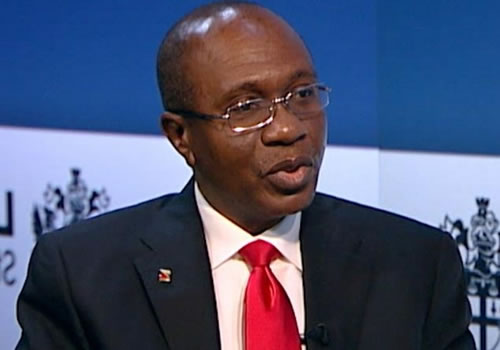The Central Bank of Nigeria (CBN) Governor, Mr. Godwin Emefiele, has defended the bank’s funding of the federal government through quantitative easing (QE).
The CBN stated that there was no substance in the claim that the central bank was overfunding the government, on the one hand, and mopping up liquidity through special auctions, on the other.
Emefiele dismissed the claim at the end of the two-day meeting of the Monetary Policy Committee (MPC) of the CBN yesterday, where the committee for the 14th consecutive month retained the Monetary Policy Rate (MPR) at 14 per cent.
The MPC also retained the Cash Reserve Ratio (CRR) at 22.5 per cent, Liquidity Ratio at 30.0 per cent, and the asymmetric corridor at +200 and -500 basis points around the MPR.
Emefiele, while speaking on the central bank’s quantitative easing, said the CBN remained one of the most transparent in the world and there was nothing illegal about the use of Open Market Operations (OMO) as a means of money supply and control in the economy.
The governor was responding to the observations made by one of the members of the MPC, Dr. Doyin Salami who had at the July meeting of the committee remarked that the CBN was providing “piggy bank” services to the federal government.
Salami had observed that the CBN’s claims on federal government at N814 billion was twentyfold higher, while the claims of commercial banks rose marginally by 0.4 per cent to N4.6 trillion; 30 per cent increase to N454 billion in CBN’s purchase of government treasury bills; five per cent increase in federal government’s overdrafts to N2.8 trillion; and an increase in the mirror account from N3 billion at the end 2016 to N1.5 trillion in April 2017.
“It is clear that the CBN has provided ‘piggy bank’ services to the federal government. To prevent the effect of continuous and massive injections of cash to fund the federal government showing up in sharply higher inflation and currency weakness, the central bank now applies ‘special auctions’.
“We thus find ourselves at a point where government borrowing from the CBN is ‘neutralised’ by raising the Cash Reserve Requirement (CRR) of banks, thereby limiting private sector access to credit. In other words, the private sector is deliberately ‘crowded-out’.
“It is ironic that the government, in need of tax revenues – having in the first half of the year accumulated its full-year deficit – is constraining the private sector,” Salami added.
However, Emefiele said there was no substance in Salami’s observation, adding that it remained one of the most transparent central banks globally.
According to him, the CBN is not just a banker but an adviser to the federal government and the lender of last resort, pointing out that there was nothing illegal about the issuance of treasury bills, which the bank uses through OMO as an instrument of monetary supply and control.
He noted that the federal government had decided that all its funds should go into the Treasury Single Account, adding that even in conventional banking, there was nothing wrong for a bank customer to request and overdraw his or her account.
He said at a time of global economic strain, every central bank comes to the rescue of their governments, stressing that there was no truth in the overfunding of government.
On the non-performing loans in the banks, Emefiele said most Nigerian lenders were within the 5 per cent threshold or slightly higher, adding that efforts were being made to do something about the few that had overshot the threshold.
Salami and another member of the MPC, Hassan Balami, at the July meeting had also expressed concern over the high NPLs of what they termed “Four Outlier Banks” with bad loans of over 15 per cent.
Salami, in particular, noted that the four banks cumulate in size to one Systemically Important Bank (SIB), taking the view that “since the failure of any of the SIBs is a source of concern, excluding these ‘Four Outlier Banks’ does not adequately take cognisance of the contagion effect which they could trigger”.
At the end of yesterday’s MPC meeting, however, the committee decided to retain the benchmark rate at 14 per cent, making it the 14th consecutive month since the policy rate was raised from 12 to 14 per cent in July 2016.
The MPC also retained the CRR at 22.5 per cent, Liquidity Ratio at 30.0 per cent, and the asymmetric corridor at +200 and -500 basis points around the MPR.
In arriving at the decision, the CBN governor said the MPC took note of the gains achieved so far as a result of its earlier decisions, including the stability in the foreign exchange market and the moderate reduction in inflation.
According to him, the option was whether to hold, tighten or ease, adding that these were subjected to extensive debate.
“As in previous meetings, although tightening would help rein in inflationary expectations and strengthen the stability in the foreign exchange market, the committee felt that it would further widen the income gap, depress aggregate demand and adversely affect credit delivery to the private sector.
“The committee also noted that tightening may result in the deposit money banks re-pricing their assets and loans, thus raising the cost of borrowing and therefore heightening the already weak investment climate and non-performing loans.
“With respect to loosening, the committee believed that although while it would make it more attractive for Nigerians to acquire assets at cheaper prices, thus increasing their net wealth, and therefore stimulate spending as confidence rises, it nevertheless felt constrained that loosening at this time would exacerbate inflationary pressures and worsen the exchange rate and inflationary conditions,” he said.

No comments:
Post a Comment